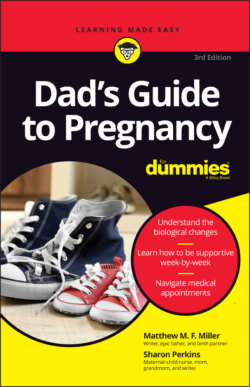Читать книгу Dad's Guide to Pregnancy For Dummies - Sharon Perkins - Страница 48
Answering FAQs about getting pregnant
ОглавлениеGetting pregnant may seem straightforward, but what exactly does it take? Here are some answers to the most common concerns:
How long does it take to get pregnant?On average, more than half of couples under age 35 get pregnant within the first six months of trying, and four out of five are pregnant within one year.
Does having more sex increase the chances of pregnancy?
No. In fact, due to the amount of time it takes for semen volume to build back up to normal levels following ejaculation, overdoing it around ovulation time by having sex several times a day can deplete your sperm count, which probably won’t be a problem if you have a normal sperm count but can be if your count is low.
Should we only have sex with my partner on her back and me on top?It’s a myth that this standard position is the best way to get pregnant. Although it may help the semen stay in better, no scientific proof exists that the sexual position you choose has any effect on conception rates. Feel free to experiment, especially if it makes having sex less like a chore and more like something you do for fun — you know, like the good old days.
Does my partner’s past use of the birth control pill mean getting pregnant will take longer?It varies from person to person. One woman can miss a single pill and end up pregnant; others may take a little longer to return to their regular ovulation pattern. The chances of getting pregnant the first month are small, but the average couple is pregnant within a year, regardless of past birth-control usage.
Is it okay to drink and smoke when trying to conceive?If you’re ready to start a family, you should both give up smoking immediately. Occasionally having a drink or two when you’re trying to become a mom or dad won’t likely produce a negative outcome, but the general rule of thumb is to live as though your partner is pregnant from the moment you begin trying to conceive. Check out the section “Assessing lifestyle choices that affect eggs and sperm,” later in this chapter, for more tips on getting healthy to improve the odds of conception.
